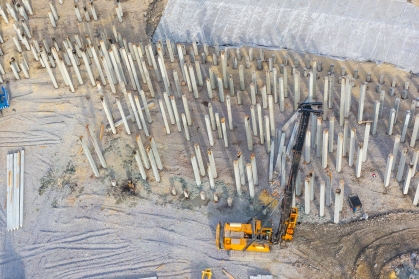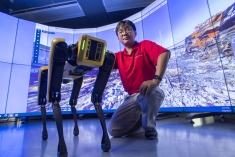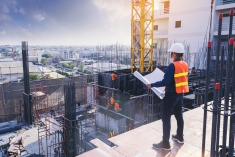Civil and Environmental Engineering Research Area
Construction Engineering and Management

At Rutgers, we view the construction industry as one type of social infrastructure. It plays a crucial role in building and maintaining the physical infrastructure that supports our communities and society as a whole. Situated in a metropolitan region with the nation’s most complex and delicate infrastructure systems, we recognize the unique challenges faced by the stakeholders of our infrastructure systems. We also understand the vast potential of automation, robotics, artificial intelligence, simulation, and decision analysis in shaping the future of infrastructure management practices.
Our research projects address fundamental challenges affecting the construction industry leveraging emerging sensing technologies, data analytics, simulation methods, and systems engineering.
Associated Faculty: Jie Gong, Meiyin Liu, Vassilika Demetracopoulou
Research Clusters
BIM, VR/AR, Digital Twin

Advanced modeling technologies, such as building Information Modeling, Virtual Reality/Augmented Reality (VR/AR), and digital twins, are transforming the ways buildings and infrastructure systems are designed, built, and operated. At Rutgers, we have an impressive portfolio of remote sensing and visualization technologies that can be used to support advanced monitoring, simulation, and visualization of construction projects. These research and education infrastructures empower Rutgers construction researchers and students to collaborate with major infrastructure stakeholders in the region to assist them in making critical decisions.
Construction Project Delivery
Alternative delivery methods have been increasingly utilized to deliver complex construction projects. From project selection to construction execution, this research directive aims to investigate the tradeoffs, risks, and selection factors for project delivery methods and provide actionable guidance to public and private stakeholders.
Infrastructure Management and Decision-Making

Population growth, urbanization, and physical constraints imposed by tight urban corridors have created a new set of challenges for infrastructure systems. As a result, this research directive aims to advance infrastructure management under the current environment by incorporating resilience and equity in infrastructure decision-making and examining interdependencies among civil systems.
High-Performance Building Systems

We perform research at the crossroads of building construction quality, building energy performance, and indoor air quality. Our goal is to quantify the connections among these three elements with advanced sensing and modeling techniques such as spatially resolved thermography mapping, building energy modeling, air quality sensing, IoT sensors, and building occupant behavior modeling. The insights will allow us to prioritize building retrofit investments and design sustainable and healthy communities.